上海牛津版英语六年级第一学期6A期末复习知识点总结
- 格式:pdf
- 大小:64.59 KB
- 文档页数:4
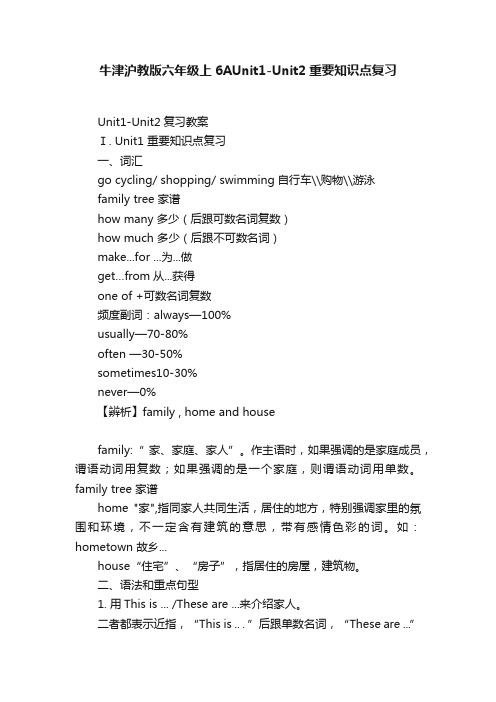
牛津沪教版六年级上6AUnit1-Unit2重要知识点复习Unit1-Unit2复习教案Ⅰ. Unit1 重要知识点复习一、词汇go cycling/ shopping/ swimming自行车\\购物\\游泳family tree 家谱how many 多少(后跟可数名词复数)how much 多少(后跟不可数名词)make...for ...为...做get…from从...获得one of +可数名词复数频度副词:always—100%usually—70-80%often —30-50%sometimes10-30%never—0%【辨析】family , home and housefamily:“ 家、家庭、家人”。
作主语时,如果强调的是家庭成员,谓语动词用复数;如果强调的是一个家庭,则谓语动词用单数。
family tree 家谱home "家",指同家人共同生活,居住的地方,特别强调家里的氛围和环境,不一定含有建筑的意思,带有感情色彩的词。
如:hometown 故乡...house“住宅”、“房子”,指居住的房屋,建筑物。
二、语法和重点句型1. 用This is ... /These are ...来介绍家人。
二者都表示近指,“This is .. . ”后跟单数名词,“These are ...”后跟复数名词或者多个不同的对象。
2.用how many 来询问数量后接可数名词的复数形式,当我们提问你有多少……时候,如果How many后跟人,常用how many... do you have?如果How many 后跟物,常用how many...have you got?3.What do you do with your... ? 和What else do you do with your... ? 来提问与家庭成员或亲戚一起做什么.else 意为别的其他的,常用于特殊疑问词或不定式之后,如what else, something else等。
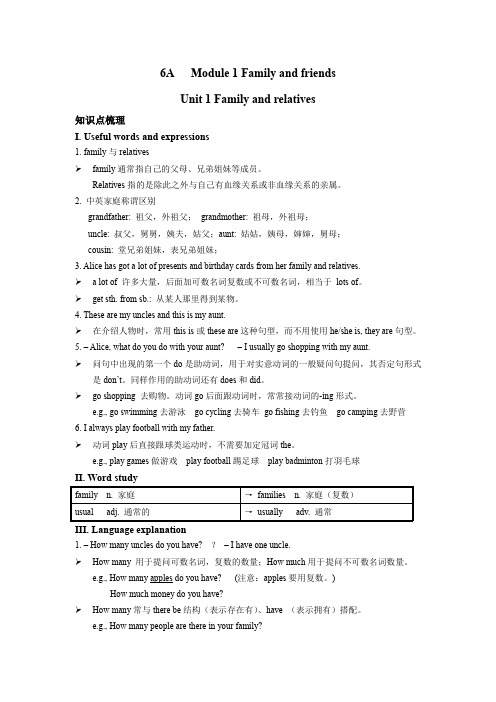
6A Module 1 Family and friendsUnit 1 Family and relatives知识点梳理I. Useful words and expressions1. family与relativesfamily通常指自己的父母、兄弟姐妹等成员。
Relatives指的是除此之外与自己有血缘关系或非血缘关系的亲属。
2. 中英家庭称谓区别grandfather: 祖父,外祖父;grandmother: 祖母,外祖母;uncle: 叔父,舅舅,姨夫,姑父;aunt: 姑姑,姨母,婶婶,舅母;cousin: 堂兄弟姐妹,表兄弟姐妹;3. Alice has got a lot of presents and birthday cards from her family and relatives.a lot of 许多大量,后面加可数名词复数或不可数名词,相当于lots of。
get sth. from sb.: 从某人那里得到某物。
4. These are my uncles and this is my aunt.在介绍人物时,常用this is或these are这种句型,而不用使用he/she is, they are句型。
5. – Alice, what do you do with your aunt? – I usually go shopping with my aunt.问句中出现的第一个do是助动词,用于对实意动词的一般疑问句提问,其否定句形式是don’t。
同样作用的助动词还有does和did。
go shopping 去购物。
动词go后面跟动词时,常常接动词的-ing形式。
e.g., go swimming去游泳go cycling去骑车go fishing去钓鱼go camping去野营6. I always play football with my father.动词play后直接跟球类运动时,不需要加定冠词the。
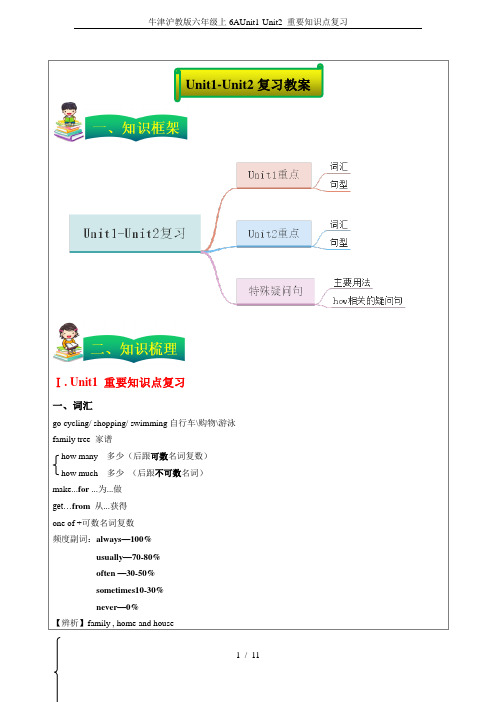
Unit1-Unit2复习教案Ⅰ. Unit1 重要知识点复习一、词汇go cycling/ shopping/ swimming自行车\购物\游泳family tree 家谱how many 多少(后跟可数名词复数)how much 多少(后跟不可数名词)make...for ...为...做get…from从...获得one of +可数名词复数频度副词:always—100%usually—70-80%often —30-50%sometimes10-30%never—0%【辨析】family , home and housefamily:“ 家、家庭、家人”。
作主语时,如果强调的是家庭成员,谓语动词用复数;如果强调的是一个家庭,则谓语动词用单数。
family tree 家谱home "家",指同家人共同生活,居住的地方,特别强调家里的氛围和环境,不一定含有建筑的意思,带有感情色彩的词。
如:hometown 故乡...house“住宅”、“房子”,指居住的房屋,建筑物。
二、语法和重点句型1. 用This is ... /These are ...来介绍家人。
二者都表示近指,“This is .. . ”后跟单数名词,“These are ...” 后跟复数名词或者多个不同的对象。
2.用how many 来询问数量后接可数名词的复数形式,当我们提问你有多少……时候,如果How many后跟人,常用how many... do you have?如果How many 后跟物,常用how many...have you got?3.What do you do with your... ? 和What else do you do with your... ? 来提问与家庭成员或亲戚一起做什么.else 意为别的其他的,常用于特殊疑问词或不定式之后,如what else, something else等。

6年级第一学期知识点总结梳理上海牛津知识点梳理牛津6AU1Part 1 单词句型1 表示和自己有直系血缘关系的:Father(父亲,爸爸)mother ( 母亲,妈妈) sister (姐姐,妹妹) brother (哥哥,弟弟)等以上称谓对于我来说都是家人,即my family members表示和自己有或无血缘关系得:Grandfather(祖父,外祖父) grandmother(祖母,外祖母),grandson(孙子,外孙)granddaughter (孙女外孙女),uncle(叔叔,舅舅),aunt(姨父,姑父阿姨,姑妈,婶婶),cousin(堂表兄,堂表第,堂表姐堂表妹)2.play games 玩游戏;play footbal 踢足球;play badminton(打羽毛球)【知识拓展】play 后跟球类运动时不加定冠词,但跟乐器时,乐器名称前要加定冠词theLet's play badminton together after school! 让我们放学后一起打羽毛球吧I usually play football with my father on Saturday. 周六我常和父亲一起踢足球I can play the piano. 我会弹钢琴Listen! Someone is playing the violin. 听有人在拉小提琴3.go 后面常跟动词的doing 形式,表示去做某件事情【知识拓展】go shopping(去购物);go swimming(去游泳) ;go cycling(去骑车)go travelling(去旅游); go fishing (去钓鱼) go skating 去溜冰;go skiing 去滑雪My grandfather sometimes goes fishing on a warm afternoon. 在暖和的下午,我爷爷It's a fine day. Let's go cycling! 多好的天气呀让我们一起去骑车吧4.go to a restaurant 去饭馆吃饭;go to the park 去公园注意这几个固定搭配中的名词前要加适当的冠词,比如:go to the cinema 去看电影go to the supermarket 去超市等My family usually go to the restaurant at the weekend. 周末我们家常去饭馆吃饭Mum, can I go to the supermarket with you? 妈妈,我能和你一起去超市吗?5.watch TV 去看电视;watch a film(看电影) 此处,watch 意思为观看,又如 watch 看卡通,动画片; watch carefully(仔细观察)I like watching cartoons very much. 我非常喜欢看卡通片The science teacher usually asks us to watch him carefully.科学老师常让我们仔细观察6.本单元出现了三个频度副词:always 总是,一直usually 经常,常常sometimes 有时We should always help each other. 我们始终应互相帮助1 / 22年级第一学期知识点总结梳理上海牛津6晚饭后我父亲经常出去散步goes out for a walk after dinner.My father usually做完作业后她有时候会看电视She sometimes watches TV after homework.Part 2 重点语法1)A :How many + 名词复数+ do you have ?B :I only have one……/ I have (number)……2)A :What (else)do you do with your + 名词?B :I always / usually / sometimes / never do sth. with my + 名词Introduction 介绍:This is ……/ These are ……Express good wishes 表示祝愿:Happy birthday !3)频度副词always ,usually ,often ,sometimes 和never 在一般现在时中的用法:放在be 动词、助动词后面,放在行为动词前面。

牛津英语6A期末复习题型汇总英汉互译。
1. 元旦节New Year’s Day 6. Sports Day 运动日2. 散步talk a walk 7. watch the running race 观看赛跑3.在我的前面in front of me 8. Japanese Cartoons 日本卡通片4. 四月二日The second of April (the 2nd of April ) 9. dress up in costumes 用戏服装扮5. 在农场on the farm 10. Let’s wait and see.让我们等着瞧1 午饭以后after lunch 6 as thinner as 跟....一样瘦2 拔萝卜pull up carrots 7 have a Christmas party 举行一个圣诞派对3 上周末last weekend 8 National Day holiday 国庆节假日4 赏月Moon-Watching 9 watch the dragon boat races 观看龙舟赛5 跑得比我快run faster than me 10 the twenty-first of October 十月二十一日2. 刚才_____just now__________ 6.blow out ___吹灭_________3. 一副眼镜__ a pair of glasses ___________ 7. at the Spring Festival 在春节8. in front of the blackboard 在黑板前9. pick them up 捡起它们选择填空。
()1.-----What is it today? -----Tuesday.A. dayB. dateC. time()2. Did you a big lunch last Spring Festival?A. hadB. hasC. have()3. My father to work from Monday to Friday.A. goesB. goC. went()4. There a pen and two books in my school bag a moment ago.A. wasB. wereC. is()5 Saturday morning, Mr. Black walked to the park.A. InB. AtC. On()6. This is my bike. is over there.A. HisB. HerC. She()7. Oh, my glasses are on the ground. Please for me.A. pick it upB. pick up itC. pick them up()8. Do you like playing volleyball?A. /B. theC. a()9. It’s time lunch.A. haveB. forC. to()10.Where you two days ago? I in Beijing.A. was, wasB. was, wereC. were, was( ) 1 A: What date is it today? B: It’s _________ 1st of October.A. aB. /C. anD. the( ) 2 What holiday _______ after May Day?A. comeB. comesC. comingD. came( ) 3 That girl _____ her grandma and her grandpa last Friday.A. visitB. visitsC. visitedD. visiting( ) 4 _______ ate many noodles last Sunday.A. Mike and IB. I and MikeC. I and mikeD. Me and Mike( ) 5 A: What ______ you do? We flew the kites. 【flew fly的过去式】A. didB. doC. doesD. don’t( ) 6 Jim and Ben are _____ about Be n’s birthday.A. talkB. sayingC. speakingD. talking( ) 7 Where are my shoes? _______.A. It’s on the desk.B. It’s under the deskC. They’re under the desk.D. It’s here.( ) 8 I t is an _____ day, we are all ______.A. excited, excitingB. exciting, excitingC. exciting, excitedD. excited, excited( ) 9 We usually _______ moon cakes at Mid-Autumn Festival.A. eatB. eatedC. ateD. eats( ) 10 Whose book is it? It’s not _____ book. It’s _____.A. my. herB. mine, hersC. mine, herD. my, hers选择题。

牛津小学英语6A复习提纲(短语、语法和句型)一、词组(本册书出现的四会和三会词组)1.a football match一场足球比赛2.between…and在…之间3.in the same team在同一队4.sit next to me 坐在我旁边5.in the corner在角落6.in front of在…的前面7.go over the goal越过球门8.time’s up时间到了9.go out of the football field飞出球场10. wonderful score一个漂亮的进球11. one all 一比一 12.No smoking 禁止吸烟13. No parking 禁止停车 14.No littering 禁止乱扔15.No swimming禁止游泳16.Keep quiet保持安静17. No cycling禁止骑车18.Keep off the grass请勿踩草19.stay away from避开 20. five years old五岁21.make noise制造噪音22.my cousin我的表兄妹23.talk about谈论 24.look around环顾四周25.Fine ten yuan罚款10元26.No eating and drinking禁止吃喝27.Do not touch禁止触摸 28.pick up拾起29. take a walk散步30.the fifth of March 三月五日31.the nineteenth week第19周 32.take off 脱下33. blow out 吹灭34.a birthday party一个生日会35.a VCD of Chinese cartoons 一盘中国卡通片的VCD36.as a birthday present作为一份生日礼物37.a piece of paper一张纸 38.fold it in half对折39.a running race一场跑步比赛40.just now 刚才41.a moment ago刚才 42.a roll of film一卷胶卷43.a pair of glasses一副眼镜 44. in July在七月45. Sports Day体育活动日46. watch the moon赏月47. a pair of earphones一副耳机 48. last week上星期49. plant trees种树50. pull up carrots拔胡萝卜51. pick up oranges摘橘子52. on the farm在农场53. an exciting film 一部令人激动的影片54. in the mountains在山里55. a science festival 科技节56. a food festival美食节 57. a kite festival 风筝节58. National Day 国庆节59. have a chat聊天60. have a good time 过得愉快61. at the weekends 在周末62. after dinner晚饭后 63. a lot of colourful kites许多色彩艳丽的风筝64. Children’s Day儿童节65.New Year’s Day新年66. their relatives 他们的亲戚 67. something to drink一些喝的东西68. dress up装扮69. favourite food最爱的食物70. dragon boat race龙舟赛 71. last year去年72. Mid-Autumn Festival中秋节73.Dragon Boat Festival端午节74. Spring Festival春节 75. eat rice dumplings吃粽子76.make pumpkin lanterns 做南瓜灯77.police station 警察局78.this morning 今天早晨 79. get off 下车80. point to 指向81. at the back of 在后部82. the present from his friend 朋友送的礼物二、语法知识1、序数词序数词的构成是在以之相对应的基数词词尾加th,个别例外:◆one – first two—second three—thirdfive—fifth eight—eighth nine—ninthtwelve – twelfth◆以ty结尾的,先变y为i,加thforty—fortieth◆缩写形式1st 2nd3rd 4th 5th 22nd 31st2、规则动词的过去时词尾变化◆一般情况下加ed◆以不发音的e结尾的加d◆以辅音字母+y结尾的变y为i,加ed。

Unit 6 Going to school知识点梳理I. Useful words and expressions1. – How do you go to school.– I go to school on foot /by bus.how用于对交通方式的提问。
I go to school on foot. = I walk to school.I go to school by bus. = I take a bus to school.2. It takes me about half an hour to get there.half an hour 半小时。
get to 到达,后接here, there, home等词时要省略to。
get there 到达那里。
3. I go to school by bus, then on foot.then在这里表示“然后”,表现出做事的先后顺序。
II. Word studyadvertise v. 刊登广告→advertisement n. 广告factory n. 工厂→factories n. 工厂(复数)III. Language explanation1. – How long does it take to get to the supermarket?– It takes me ten minutes to get there.How long 用于对时间长短的提问, “多久”,“多长时间”。
It takes sb. some time to do sth. 花费某人多长时间去做某事。
= Sb. spend some time on sth. / (in) doing sth.e.g., It takes me about an hour to finish my homework every day= I spend about an hour on / (in) finishing my homework every day.It takes sb. some time to do sth 此句中,sb如果是代词,必须使用宾格形式。

6A 期末考试重要语法点和作文训练go to school1.travelling time to school2.on my way to school3.on our way home4.get there, get home5.live near school6.live far away from school7.go to school by bus=take a bus to school8.It takes him about ten minutes.How long does it take him?9.by ferry, by underground----How..?10.four—fourth, forty--fortiethon the fourth flooron the twentieth floor11.half an hour=thirty minutesone and a half hours=an hour and a half12.go to school on foot=walk to school13.go to different places14.How long does it take you to get to the supermarket?15.It takes me about ten minutes to get there.16.get to the library, libraries17.on our way to school18.see some restaurants19.take a bus to school=go to school by bus20.then on foot21.some shops=a few shopssome bread=a little bread22. a lot of people=many peoplea lot of bread=much bread24.when I’m on the buswhen I’m walking to school=on my way to school25.some parents=a few parentsa lot of students=many students26. How does Simon go to school?He goes to school by…., then…26.an advertisement board27.on the way to schoolon your way to schoolon our way home28.talk with sb. about sth.29.by school busby light rail----How?30.some department stores= a fewsome housing estatessome kindergartenssome swimming poolssome factories31.go travellinggo shoppinggo swimming32. an hour, half an hour,one and a half hours=an hour and a half33. a few=somea little=someU71.rules round us=rules around us2.have rules in the classroom3.have rules in the library4.have rules on the road5.have rules in the park6.We must not walk on the grassmustn’tDon’t walk on the grass.7.We must not play basketball.Don’t play basketball.8.mustn’t leave rubbish9.mustn’t eat or drink10.wait for the green manman---men11.must keep quiet=mustn’t talk loudly12.listen to the teachers13.must not draw on the desks14.run across the road=cross the road15.must not pick the flowerspick up rubbish16.Don’t walk on the grass.=We mustn’t walk on the grass.17.Don’t eat or drink.=We mustn’t eat or drink.18.enter=go into=come into, entrance, at the entrance19.talk loudly20.turn left, on the left/ right21.What does this sign mean?mean v. meaning n.What’s the Chinese meaning?What’s the meaning of…?22.Where can we find it?We can find it in the library.23.in the shopping center24.an escalator25.We must leave our bicycles on the right.Where must we leave our bicycles?26.We must use the door on the left.----Which door must we use?27.go upstairs, come downstairs28.We must use the escalator in the middle.Which escalator must we use?29.class ruleskeep class rules, break class rules30.We must not eat or drink in the classroom.=Don’t eat or drink in the classroom.31.We must keep quiet.=Keep quiet.32.chase each other=run after each other, help each other,be kind to others=be friendly to others33.must not=mustn’t34.be late for school35.listen to our teachers in class36.teach us English, teach them Maths37.look at the photo of my father and mea friend of mine=one of my friendsphoto—photos, potato—potatoes,tomato—tomatoes38.in front of, behind39.work there40.like cooking delicious food=like to cook tasty food41.Would you like to be…?=Do you want to be…?42.How about going swimming?=What about going swimming?43.That sounds great!U81.dinner menuhave breakfast/ lunch2.What would you like for dinner tonight?tonight=this eveninglast night=yesterday evening3.steamed prawns with garlic4.I’d also like some soup5.What kind of soup/ food…?6.Let’s have tomato, shall we?7.I like tomato best.=Tomato is my favourite.8.have tomato and egg soup9.fried eggs with bacon10.strawberry—strawberries11.need to buy some fooddon’t need to buy any food=needn’t buy any food12.shopping list13.fried cabbagefried eggs with bacon14.boiled eggs15.buy different foodbuy sb. sth.= buy sth. for sb.pare the prices of food17.in the marketin the supermarket18.at the fish stallat the vegetable stallin the fruit sectionin the meat section19.Have you bought any garlic?Would you like some…?Would you like to have some..?May I have some…?Can I have some…?Shall we have some…?20.I have bought some garlic.Where did you buy it?I haven’t bought any garlic.Where will you buy it?21.in the market, at the vegetable stall22.How much was it?=How much did it cost?How much is it?=How much does it cost?23.It was five yuan.=It cost five yuan.24.This book cost me ten yuan.This book didn’t cost me ten yuan.How much did this book cost me?I spent ten yuan on this book.I spent ten yuan buying this book.I pay ten yuan for this book.25. My favourite food is apples.=Apples are my favourite food.= I like apples best.25.look at the list of food26.in the pictures27.fried rice28.baked potatoes29.sandwich—sandwichesmonth---months, mouth—mouthsU91.Picnics are fun.What great fun it is!funny a.=interesting2.plan a picnic, have a picnic, go for a picnic plan—planning, plan… for3.Let’s have a picnic tomorrow, shall we?That’s a good idea.All right.=OK.4.Shall we buy some soft drinks?That’s a good idea.All right. =OK.5.I’d like to buy some…=I want to buy some…I wouldn’t like to buy any..I don’t want to buy any…6. a bottle of jam, two bottles of jam7. Bread tastes nice with jam8. chilli---chillies9. go to sp. to do sth.go to the supermarket to buy some food for the picnic10. Why do you like apple juice.I like it because it’s sweet.11.I like oranges because they are sweet.Why do you like oranges?12. Let’s buy some spicy sausages.13. I don’t like spicy sausages because they are too spicy. Why don’t you like spicy sausages?14. taste---tastybake---bakedboil---boiledspice---spicyfry---friedsteam---steamed15. too sweet, too salty, too spicy, too sour, too bitter16.Shall we have some bread?17. Let’s buy some jam.18. spread on the bread19. a big bag of icetwo bags of ice20. eat a lot of things=many=lots of=plenty of21. sun—sunny, cloud—cloudy, rain—rainy, fun—funny22.prepare for a picnic=get ready for23. Have they got enough money?enough food, enough time,warm enough, well enough23.How much money do they need from…?24.I have got twenty-one yuan.How much money have you got?25.May I have some…?OK. Here you are./ Sure./ All right.26.I like chicken wings because they are delicious. Why do you like chicken wings?27.Would you like some…?Yes, please. / No, thanks. /No, thank you.29. I don’t want any cola because it’s too sweet.Why don’t you want any cola?U101.healthy eating=a healthy dietunhealthy, healthkeep healthy, keep us healthy,keep our health2.look at the pyramid3.It shows us=It tells us4.how much of each kind of food5.every day, everyday English6.We need a little fat, salt and sugara little=some7. We need some yogurt.We don’t need any yogurt.Do you need any yogurt?7.need plenty of fresh fruit and vegetablesplenty of=a lot of=lots of=many=much=enough8.need a lot of rice, noodles and bread9.How much fruit do we need every day?10.How much+UN.How many+CN.some+CN./UN.11.live in the city, citiesone of the best cities, one of the biggest cities12.fat and unhealthyfat—fatter, healthy—healthier13.have an unhealthy diethave a healthy diethave—had—had14.do some exercise, do no exercisedo some Maths exercises15.live in the countryside16.fit and healthyfit=healthy17.work in the garden every day18.one day, one morning, one evening,in the morning/ afternoon/evening, on Sunday morning, on Wednesdayafternoon, on the morning of January 1419.go to visit sb.=see20.I had lunch with her.I didn’t have lunch with her.Did you have lunch with her?21.some chips=a few chipssome ice cream=a little ice cream22.I don’t have that kind of food23.only eat a little salt and sugar24.stay with his cousin25.for a few weeks=for some weeks-----How long…?26.eat---ate---eatenHave…eaten, haven’t eatenDid…eat, didn’t eat27.become fit and healthybecome—became—become28.What did you have for breakfast yesterday?I had eggs and milk.29. Eggs are my favourite food.=I like eggs best.29.I had a lot of cola for lunch.=drankI didn’t have much cola for lunch.Did you have much cola for lunch?30.I had steamed chicken with rice.=ate31.some vegetable soupat the vegetable stallplenty of vegetables32.have a lot of boiled vegetables for dinner.33.Your diet is unhealthy. Mine is healthy.34.healthier thanless healthy than=unhealthier thanas healthy as, as unhealthy asas old as35.eating habits36. a quiz about eating habits,a quiz about swimming37. brush your teeth38. before you go to bed=before going to bed39.wash hands40. eat a lot of fried food41. should+ do, should not=shouldn’t+do41. I should not eat too much spicy food.42. too many+cn., too much+un.too little+un.too little money44.suggest—suggestionsuggestions for good eating habitsU111.Let’s make a pizza, shall we?Shall we make a pizza?2.how to make a pizza3. a funny pizza=interestinggreat fun, really funny4.look very interesting, look happy,look at me happilysound great/ wonderful5.Shall we make one more?I want to buy two more.6. look at the ingredients first7. a few slices of ham8. two tomatoes, two potatoes, two photos9. two pieces of bread10. a small tin of tomato sauce11. a few cherries12.Firstly, secondly, next, then, after that, finally13. use…as…14. a thick piece of bread15. as the base16. put some tomato sauce on it17. in the middle, on the right/ left18. Would you like another cup of tea?anotherone…the otherin the other hand, in your other hand19. above each slice of sausagebelow20. in front of---behind21. on both sides of the breadon both sides of the road/ river=on either side of the road/ river22. in a hot oven23. bake it for 5 minutes---How long…?24. ingredients for…25. strawberry—strawberries, cherry--cherries26. an onion27. chilli—chillies28. an egg29. a useful bookan interesting job=interesting worka U, an L, an M30. want to do sth.31. in different ways32. Here you are.Here we are.32. a shopping list33.get a trolley, trolley—trolleys34.We need to buy some drinks.We don’t need to buy any drinks.Do you need to buy any drinks?35.get some cola in the drink section=buy36.I’d also like to have some grapes.I also likeI can alsoI should also38. in the frozen food section, freeze—frozen39. Can I go and get some?=Can I go to buy some?40. Sure.=Certainly.=Of course.41. Ice cream is your favourite.=You like ice cream best.42. bakery section43. over thereThe man over there is my father.Which man is your father.My father is over there.Where is your father?45.next to the snack section=beside46.so much bread, so many people, so little money47.I like shopping here.=I like to shop here.On my way to schoolI live far away from school. I go to school by bus, then on foot. It takes me about20 minutes to get to school. I see some restaurants, a few shops and a lot of people when I am on the bus. I see some teachers, a lot of students and a few parents when I am walking to school.My favourite foodI like bananas. I also like oranges very much. But my favourite food is apples because they are very sweet. They are tasty and good for our health. Some look red, others look green. There is a saying, “An apple a day, keep a doctor away.” So I like apples best.Class rulesWe have rules in our class. We must keep quiet in class. We mustn’t talk loudly. We must not eat or drink in the classroom. We mustn’t leave rubbish.We must listen to the teachers. We mustn’t chase each other. We must keep our class rules. We must not break our class rules.Preparing for a picnicMy parents and I are preparing for a picnic. We are going to Binhai Park to have a picnic next Sunday. We are going there by bus. We are going to buy some bread, a bottle of jam, some spicy sausages, some cola and some apple juice. We will have a good time.To keep healthyWe should have a good eating habit. We should eat a little fat, salt and sugar. We should eat some meat and fish. We should eat plenty of fruit and vegetables. We should eat a lot of rice, noodles and bread. We should not have too much cola. We shouldn’t eat too much spicy food. We should keep fit and healthy.。
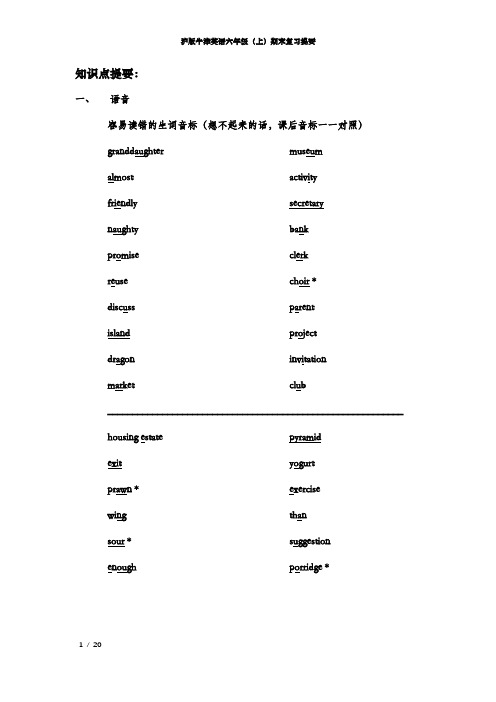
知识点提要:一、语音容易读错的生词音标(想不起来的话,课后音标一一对照)granddaughter almost friendly naughty promise reuse discuss island dragon market museum activity secretary bank clerk choir * parent project invitation club___________________________________________________________housing estate exitprawn * wingsour * enough pyramid yogurt exercise than suggestion porridge *二、词汇与词组1.容易错的单词拼写➢an aunt / an uncle 首字母发音都是元音,所以前面跟的不定冠词用“an”,同理,an hour ago (h不发音,所以用an).➢注意比较:an umbrella vs. a useful book 虽然都是字母U开头,但是因为u的发音不同,所以前面跟的冠词就不一样。
另外,需要特别注意interesting / exciting 这样的元音开头的形容词,它们放在某个单数名词前面做修饰,这时也要用冠词an;但如果在它们前面又加了程度副词v ery / more…则冠词又必须变回a。
比如:a book vs. an interesting book vs. a very interesting book➢the Earth (大写E,且前面必须使用定冠词the, 表示独一无二的事物) ➢Friends of the Earth 表示一个环保组织(属于专有名词),F / E大写。
牛津课本上是把他们看成该组织的所有成员(相当于people),动词用复数;不过,某些习题书上也会把它看成一个组织,动词用单数。
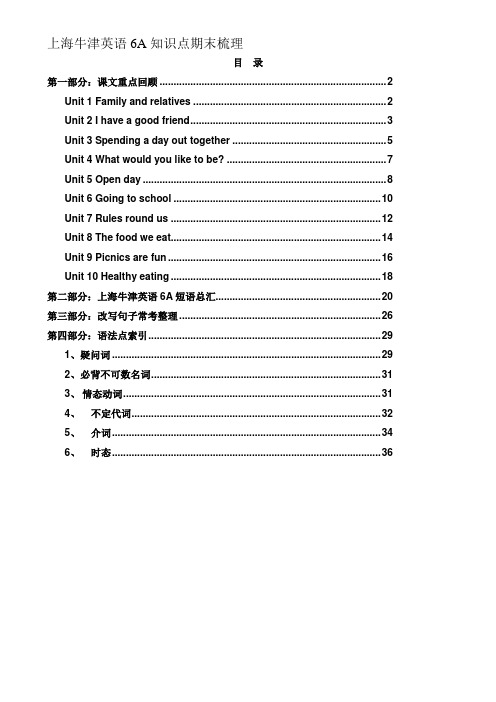
上海牛津英语6A知识点期末梳理目录第一部分:课文重点回顾 (2)Unit 1 Family and relatives (2)Unit 2 I have a good friend (3)Unit 3 Spending a day out together (5)Unit 4 What would you like to be? (7)Unit 5 Open day (8)Unit 6 Going to school (10)Unit 7 Rules round us (12)Unit 8 The food we eat (14)Unit 9 Picnics are fun (16)Unit 10 Healthy eating (18)第二部分:上海牛津英语6A短语总汇 (20)第三部分:改写句子常考整理 (26)第四部分:语法点索引 (29)1、疑问词 (29)2、必背不可数名词 (31)3、情态动词 (31)4、不定代词 (32)5、介词 (34)6、时态 (36)第一部分:课文重点回顾Unit 1 Family and relatives1. This is my grandfather.这是我的(外)祖父。
These are my family and relatives.这些是我的家人和亲戚。
2. I’m their son.. 我是他们的儿子。
We’re their sons.我们是他们的儿子。
3. sth. from sb.某物来自某人。
This is a birthday card from my friend.这是一张来自我朋友的生日卡片。
4. Happy birthday to sb.祝某人生日快乐。
5. one of your family members你的家庭成员之一。
one of后面应接可数名词的复数形式。
6. How many uncles do you have?你有多少个叔叔?How many后面接可数名词的复数形式。

沪教(一起)6A Unit 6 Going to school 知识点总结1.traveling time to school 去学校行走时间2.it takes sb. some time to do sth. 某人花一段时间做某事3.It takes him about ten minutes. 他花大约十分钟。
4.half an hour 半小时5.go to sp. by ferry 乘渡船去某地6.go to school on foot=walk to school 步行去学校7.how long 多久8.get to sp. 到达某地9.get to the supermarket 到达超市10.g et there/here/home 到达那儿/这儿/家里11.a restaurant 一个饭店12.a hotel 一个旅馆13.a n advertisement board 一块广告牌14.a few + c.n. 几个;一些(后跟可数名词复数)15.a lot of + c.n. & u.n. 许多(后跟可数名词复数或不可数名词)16.o n one’s way to school 在某人去某地的路上17.o n my way to school 在我去学校的路上18.b y light rail 乘轻轨19.d epartment stores 百货商店20.g o to kindergarten 上幼儿园语言点1. near 离…很近后面直接接地点I live near school.=My home is near school.我家离学校很近。
2. far away from=far from离…很远He lives far away from school.=His home is far from school.他家离学校很远3.by bus/bike/car/underground/train/ferry动词短语:take a bus/bike/car/underground/train/ferry ride a bikeHe goes to school by bus.=He takes a bus to school.4. on foot 动词:walkShe goes to work on foot every day.=She walks to work every day.5. It takes sb. some time to do sth. 花费某人多少时间做某事。

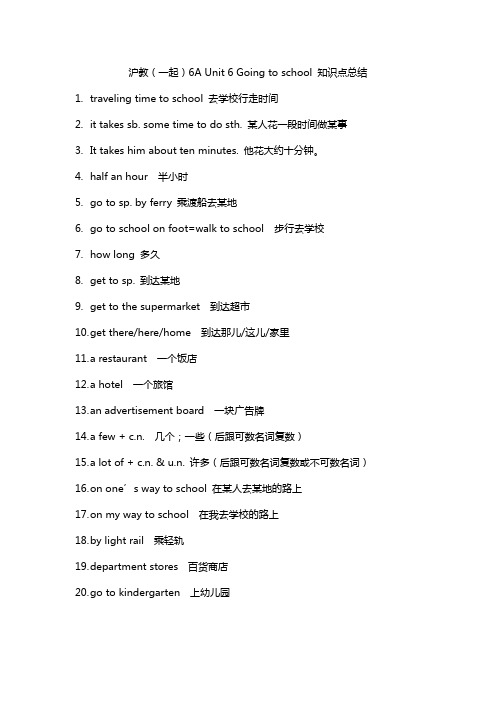
沪教(一起)6A Unit 6 Going to school 知识点总结1.traveling time to school 去学校行走时间2.it takes sb. some time to do sth. 某人花一段时间做某事3.It takes him about ten minutes. 他花大约十分钟。
4.half an hour 半小时5.go to sp. by ferry 乘渡船去某地6.go to school on foot=walk to school 步行去学校7.how long 多久8.get to sp. 到达某地9.get to the supermarket 到达超市10.g et there/here/home 到达那儿/这儿/家里11.a restaurant 一个饭店12.a hotel 一个旅馆13.a n advertisement board 一块广告牌14.a few + c.n. 几个;一些(后跟可数名词复数)15.a lot of + c.n. & u.n. 许多(后跟可数名词复数或不可数名词)16.o n one’s way to school 在某人去某地的路上17.o n my way to school 在我去学校的路上18.b y light rail 乘轻轨19.d epartment stores 百货商店20.g o to kindergarten 上幼儿园语言点1. near 离…很近后面直接接地点I live near school.=My home is near school.我家离学校很近。
2. far away from=far from离…很远He lives far away from school.=His home is far from school.他家离学校很远3.by bus/bike/car/underground/train/ferry动词短语:take a bus/bike/car/underground/train/ferry ride a bikeHe goes to school by bus.=He takes a bus to school.4. on foot 动词:walkShe goes to work on foot every day.=She walks to work every day.5. It takes sb. some time to do sth. 花费某人多少时间做某事。
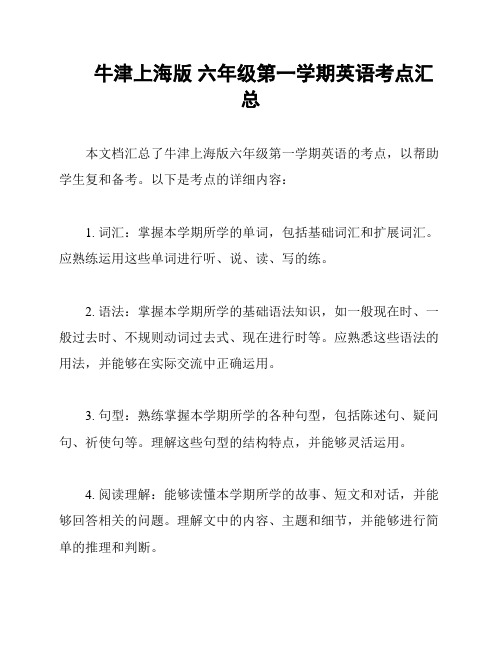
牛津上海版六年级第一学期英语考点汇
总
本文档汇总了牛津上海版六年级第一学期英语的考点,以帮助学生复和备考。
以下是考点的详细内容:
1. 词汇:掌握本学期所学的单词,包括基础词汇和扩展词汇。
应熟练运用这些单词进行听、说、读、写的练。
2. 语法:掌握本学期所学的基础语法知识,如一般现在时、一般过去时、不规则动词过去式、现在进行时等。
应熟悉这些语法的用法,并能够在实际交流中正确运用。
3. 句型:熟练掌握本学期所学的各种句型,包括陈述句、疑问句、祈使句等。
理解这些句型的结构特点,并能够灵活运用。
4. 阅读理解:能够读懂本学期所学的故事、短文和对话,并能够回答相关的问题。
理解文中的内容、主题和细节,并能够进行简单的推理和判断。
5. 听力理解:能够听懂本学期所学的对话、问答和短文,并能
够回答相关的问题。
理解听力材料中的信息、关键词和上下文,并
能够从中获取必要的信息。
6. 书写能力:书写要规范、清晰、工整。
应注意字母的大小写、大小比例和书写流畅度。
能够正确书写所学的单词、短语和句子。
7. 口语表达:能够运用所学的句型和词汇进行口语交流。
应注
意语音语调的准确性和自然流利度。
能够表达自己的观点、描述事
物和表达意愿。
希望通过对以上考点的复和总结,学生们能够在英语考试中取
得好成绩。
祝大家好运!
(Word count: 195)。
上海牛津版英语六年级第一学期6A 期末复习知识点总结频度副词副词介词地点、方位表述near 离**近far (away )from 离**(很)远直接接地点I live near school. He lives far away from school. Arrive in 到达+大地方(国家、城市等) Arrive at 到达+小地方(车站、学校等)arrive in Shanghai arrive at the airport get to 到达+某地get to school. 到达那里”只能说get therereach 到达+某地reach schoolLeave 离开+某地He will leave Shanghai.方位词:方位词east / west / north / south / north-east / north-west / south-east / south-west AB 两地不相邻 A is north B.Beijing is north Nanjing.AB 两地接壤 A is on the north of B. Heilongjiang is on the north of Jilin.. A 包含B, B 属于 A B is in the north of A.Beijing is in the north of China.代词one 用来指代一个人或事物,而ones 用来指代一些人或事物。
定冠词the 用法:在球类运动前不加定冠词play football / basketball / tennis, 在乐器前必须加定冠词play the piano / violin, 在球类运动前不加定冠词watching television数词、量词a few 只能修饰可数名词,与可数名词的复数形式连用,a few eggs.a little只能修饰不可数名词, a little milk.频度副词always 、sometimes 、usually、never提问How often? 例:How often do you go swimming? —Twice a week. 位置系动词be 之后She is always kind.行为动词之前She always helps other people.错误She is always helps other people. (×) 一句话中不能同时出现两个动词。
区别how often how many times问“频率次数+时间范围”How often do you exercise? —Twice a week.问”次数” How many times have you been there?副词表示动作特征或性状特征,一般用来形容或修饰形容词、动词、其他副词和句子。
用法修饰形容词:He looks very happy.修饰动词:The old lady is walking slowly now. 修饰句子:Luckily, he got the first prize.次数副词一次once, 两次twice, 三次及以上: 数字+times介词又叫前置词,通常位于名词之前。
分为时间介词、地点介词、方式介词、原因介词、数量介词等用法With **(与**一起)例:I ’ll go there with JIM.With 接人称代词时,要用宾格。
With me/him/her/it/us /them表示具体的某一层楼用on+序数词+floor 。
On the ground floor, on the first floor. 表示具体的某一天用介词on 。
On Sunday, On Sunday morning, On the Open Day.the one on the left/right ,the one in the middle =the left/right/middle one.some a lot of plenty of 既可修饰可数名词又可修饰不可数名词。
当与可数名词连用时,只能与可数名词的复数形式连用some eggs. a lot of milk.Plenty of eggs.Some any some 用在肯定句中,any 用于否定和疑问句中。
I h ave some new books. Do you have any new books? I don ’t have any new books.too many too much too few too little too many +可数名词复数Too many sweets are bad for your teeth. too much +不可数名词Don ’t drink too much cola. too few +可数名词复数you eat too few eggs. too little+不可数名词You eat too little fruit.fewer less more fewer (few 的比较级)+不可数名词less (little 的比较级)+可数名词more (many 、much 共同的比较级)+可数名词、不可数名词You should have less meat, fewer soft drinks and do more exercise. 其他 a slice of /slices of; a tin of/ tins of;a bag of/ bags of;a piece of/ pieces ofa quarter of 四分之一three quarters of 四分之三交通工具by bus/bike/car/underground/train/ferry He goes to school by bus. take a bus/car/underground/train/ferry He takes a bus to school.他的交通工具都能用take 来表示乘,但bike 只能用ride a bikeHe rides his/a bike to school.on foot 步行She goes to work on foot every day.=She walks to work every day.现在完成时时间表达方式疑问句问内容What What does this sign mean? What kind of soup/fruit would you like? 问原因WhyWhy do you like apple juice?I like apple juice because ….现在完成时构成:have/has +动词的过去分词(1)表示动作发生在过去,对现在有影响。
I have read this book three times.(2)表示从过去某一时间开始到现在一直在做某事。
I have been in CHINA for three years.用法have/has been to 去过/到过(现在已经回来) have/has gone to 去/到(表示现在还没有回来)She has been to JAPAN. (她去过日本)She has gone to JAPAN. (她去日本了)have/has been in = have lived / stayed in 一直住在I have been in CHINA for three years.= I have lived in CHINA for three years. already 已经/just 刚刚(多用于肯定句,放于动词前)。
I have already been to Lily ’s home.(已经到了)I have just been to Lily ’s home.(刚刚到)yet 迄今,还(多用于疑问句和否定句,放于句末)Have you been to Lily ’s home yet? No, I haven ’t been to her home yet.日期9月9日的表达:on the tenth of September 或on September tenth 几点钟2点15分:two fifteen =a quarter past two 3点10分:three ten = ten past three 1点半:one thirty = half past one 2点40分:two forty = twenty to three上下午上午和下午用a.m.和p.m.来表示。
at 10 o ’clock a.m.顺序First,……Next, ……Then,……After that,……Finally,……Finally = at last = in the end问地点Where Where do we go?问时间When When do you go to school every day?问频率How often How often do you go swimming? Usually, I go swimming twice a week.问数量How manyHow much How many+可数名词的复数形式。
How many uncles do you have? How many+不可数名词的复数形式。
How much money do you have?哪一个Which Which place shall we visit?问意见Would you like Would you like some coffee? Yes, please./ No, thanks.情态动词情态动词情态动词是表示说话人情绪,态度或语气的动词,不能单独作谓语,要和其他动词原形构成谓语。
包括can (could), may (might), must, need, ought to, dare (dared), shall (should), will (would) 。
must must not 必须、很重要或必要不准,不允许或禁止We must study hard.You mustn’t leave school alone.提问把情态动词单独提前Must we wait for you? Yes, you must ; No, you needn’t.(非mustn’t)花钱花时间cost 花钱主语为物How much does it cost? It cost (me) 5 yuan.take 花时间主语为it It takes sb. some time to do sth. It takes me 10 minutes to go to school. spend 花钱/时间主语为人Spend time/money on sth. spend time/money in doing sth.I spend two yuan on this pen. = I spend two yuan in buying this pen.表示提议的句型Shall we Shall 是情态动词+接动词原形Shall we have a picnic tomorrow?Let’s +接动词原形Let’s have a picnic tomorrowWould you like +名次/代词/动词不定式Would you like some snacks? -------No, thanks.How about whatabout+名次/代词/动名次How about going out with me tomorrow?Why not +动词原型Why not try again?将来时一般将来时表示将来某时发生的动作或状态,常与tomorrow/next +时间词/in+一段时间/in the future连用构成will/shall + 动词原型I will meet them at the entrance.is/am/are going to +动词原形They are going to go fishing tomorrow.连词连词用于连接两个简单句and or 连接肯定句中的平行并列关系连接否定句中的平行并列关系She can read and write.She can‘’t read or write.also too 用在句中,紧靠动词用在句尾,并且要用逗号隔开I also want a cup of tea.I want a cup of tea, too.比较级最高级比较级将二者进行比较产生的词形最高级将三者及以上进行比较产生的词形比A更**不如A **像A一样** 不像A一样** 比较级than Aless原级than Aas原级as Anot so(as) 原级as AThis sugar is healthier than that.This sugar is less healthy than that.This sugar is as healthy as that.This sugar is not so healthy as that.最高级最高级中的一个The 最高级名词one of the最高级名词复数,最**的之一Man is the most intelligent animal.Dolphin is one of the most intelligent animals。